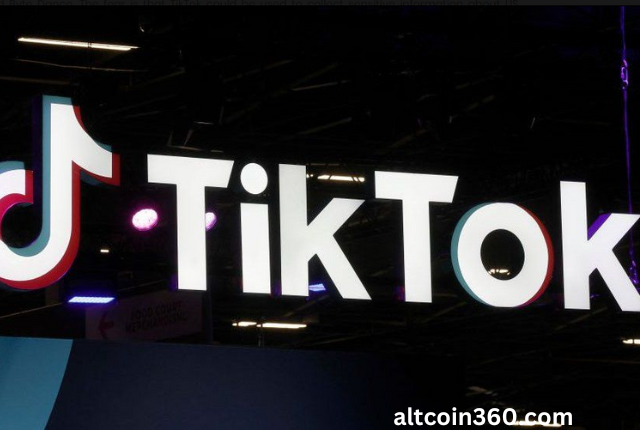Comprehensive Analysis of the Impact of TikTok Ban Bill on the Crypto Industry

Introduction
The intersection of technology, social media, and cryptocurrency has given rise to unique challenges and opportunities in recent years. One of the most significant developments in the social media landscape has been the rise of TikTok, a short-form video platform that has gained immense popularity worldwide.
However, as governments and regulators grapple with concerns about data privacy, national security, and content moderation, the crypto industry finds itself facing unexpected consequences due to the proposed TikTok Ban Bill. In this comprehensive analysis, we will delve into the potential impact of such a ban on the crypto industry.
TikTok’s Role in the Crypto Ecosystem
Before we explore the implications of a TikTok ban on the crypto industry, it’s essential to understand the role TikTok plays within this ecosystem. TikTok has served as a platform for both educational content and promotional material related to cryptocurrencies.
Many crypto influencers use TikTok to reach a broader audience, simplifying complex concepts and offering trading tips to newcomers. Additionally, TikTok has been a channel for promoting initial coin offerings (ICOs) and decentralized applications (dApps).
Disruption of Educational Content
One immediate consequence of a TikTok ban would be the disruption of crypto-related educational content. TikTok has become a go-to platform for individuals seeking to learn about blockchain technology, cryptocurrencies, and investment strategies.
Crypto educators, often referred to as “crypto TikTokers,” provide bite-sized lessons and insights that make these topics more accessible to the general public. A ban on TikTok could hinder the dissemination of valuable information about cryptocurrencies.
Impact on Market Sentiment
The crypto market is highly influenced by sentiment and social media trends. TikTok’s role as a platform for discussing cryptocurrencies and sharing market analysis has contributed to fluctuations in market sentiment.
Positive endorsements or criticisms from influential TikTokers can lead to sudden price movements in cryptocurrencies. Therefore, a ban on TikTok could disrupt this source of market information, potentially reducing the volatility caused by social media-driven sentiment shifts.
Promotion of Scams and Frauds
While TikTok has been a source of valuable crypto content, it has also been a breeding ground for scams and fraudulent schemes. Some users have exploited TikTok’s format to promote fraudulent investment opportunities, Ponzi schemes, and giveaways that require users to send cryptocurrency to receive more in return.
Regulatory concerns around such activities have been a driver of the proposed TikTok Ban Bill. A ban could help curb the spread of crypto-related scams on the platform.
Regulatory Rationale for a TikTok Ban
The proposed TikTok Ban Bill is rooted in several regulatory concerns, which, if addressed, could have broader implications for the crypto industry:
- Data Privacy: TikTok, like many other social media platforms, has faced allegations of mishandling user data. The fear of personal data falling into the wrong hands, particularly if owned by foreign companies, has been a driving force behind the ban proposal. Crypto platforms also handle sensitive data, such as user wallets and transaction history, and may face similar privacy concerns. Increased scrutiny on data privacy could lead to stricter regulations in the crypto space.
- National Security: The Chinese ownership of TikTok has raised national security concerns in some countries. Governments worry that the platform could be used for espionage or data collection, potentially undermining national security. The crypto industry also operates in a global environment and may need to address similar national security concerns in the future, especially with the growing interest in digital currencies issued by central banks (CBDCs).
- Content Moderation: TikTok has struggled with content moderation, including the spread of harmful or inappropriate content. This challenge is shared with the crypto industry, which has grappled with the rise of “meme coins” and speculative tokens. Increased scrutiny of content on TikTok could set a precedent for regulating crypto content more rigorously, which could impact the promotion of risky or unverified projects.
The Impact on Crypto Regulation
While a TikTok ban may seem unrelated to the crypto industry at first glance, it highlights broader regulatory concerns that could influence the way cryptocurrencies are regulated in the future:
- Strengthened Data Privacy Regulations: A TikTok ban could catalyze stronger data privacy regulations for all technology platforms, including cryptocurrency exchanges and wallets. Users’ trust in the security of their data is essential for the crypto industry to thrive.
- Enhanced National Security Measures: Heightened national security concerns could lead to stricter KYC (Know Your Customer) and AML (Anti-Money Laundering) requirements for crypto platforms. Governments may require greater transparency about the ownership and movement of digital assets.
- Content Moderation Standards: If the ban on TikTok leads to stricter content moderation standards, it could set a precedent for regulating content related to cryptocurrencies. Crypto influencers may face increased scrutiny, and projects with questionable legitimacy may find it harder to promote their offerings.
- Global Regulatory Alignment: The global nature of the crypto industry means that regulatory changes in one jurisdiction often have ripple effects worldwide. A TikTok ban in one country could encourage others to follow suit, potentially leading to more coordinated efforts to regulate cryptocurrencies on an international scale.
Conclusion
The proposed TikTok Ban Bill, while primarily focused on addressing concerns related to data privacy, national security, and content moderation, could have far-reaching implications for the crypto industry.
TikTok has played a significant role in educating the public about cryptocurrencies, influencing market sentiment, and, in some cases, promoting scams. As governments grapple with these issues, they may set precedents and introduce regulatory changes that impact the crypto industry’s operation and reputation.
While a TikTok ban may disrupt certain aspects of the crypto ecosystem, it also presents an opportunity for the industry to demonstrate its commitment to responsible practices.
Strengthening data privacy, adhering to national security measures, and maintaining transparent content moderation standards can help build trust with regulators and the broader public.
Ultimately, the interplay between technology, social media, and cryptocurrency is complex and ever-evolving. The impact of a TikTok ban on the crypto industry will depend on how regulators approach these broader issues and how the industry responds to potential regulatory changes.
Adaptation and collaboration between stakeholders will be key in navigating the evolving regulatory landscape and ensuring the long-term success of the crypto industry.




